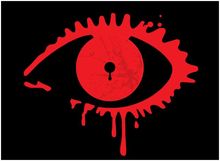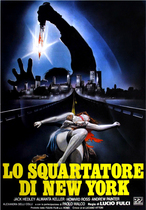Our editor-in-chief Nate Yapp is proud to have contributed to the new book Hidden Horror: A Celebration of 101 Underrated and Overlooked Fright Flicks, edited by Aaron Christensen. Another contributors include Anthony Timpone, B.J. Colangelo, Dave Alexander, Classic-Horror.com's own Robert C. Ring and John W. Bowen. Pick up a copy today from Amazon.com!
Dead Set (2008)
The walking dead have long been used as a way for writers and directors to make comments on contemporary society and culture, from Hammer's Plague of the Zombies (1966), with the exploited undead being forced to work the tin mines, to George A. Romero's Dawn of the Dead (1978), where people rise from their graves – and head straight for the shopping mall. Dead Set, a five-episode television series that aired over consecutive nights on British satellite channel E4, uses its zombies to explore the reality television phenomenon. However, rather than doing this through clunky heavy-handed dialogue, the satirical elements are contained in some rather more subtle symbolism.
The story takes place at the Big Brother house, where a group of strangers are locked in, waiting to see which one of them will be voted off the show by the viewing public, blissfully unaware that the rest of the country is more concerned with the small matter of a mysterious zombie plague sweeping Britain. Will anyone make it out alive? Will Kelly, the feisty heroine, ever be reunited with her boyfriend? Moreover, will the feuding housemates finish each other off before the undead have chance?
Although Dead Set's creator and writer Charlie Brooker is best known in the UK for his acerbic and very funny day job as The Guardian newspaper's television critic, this is definitely not a comedy. This is straightforward, grim and grisly horror, albeit with a strong streak of jet-black humor running through the script.
The pacing of the story is frenetic throughout, which is something of a double-edged sword. The adrenaline pumps, and there is definitely never a dull moment, with everyone almost permanently running from or fighting back against the zombies. Beyond some short discussions from the characters about terrorists and God, no explanations are ever offered for who or what is behind the outbreak, which ensures no slacking of the pace. I think that this is justified in the context of the story, which is about the fight for survival in the here-and-now, rather than getting too mired in the past or what is going to happen in the future.
The rapid pace also means that some people are killed off before you have even had to chance to register their existence. Apart from the main protagonist Kelly, we get little or no back-story for any of the other characters and no mention of any life or family for them outside of the Big Brother house. All this made it harder for me to warm to and care about many of them, limiting the emotional impact when anything threatens or happens to them. This is particularly apparent when you get to the ending, which could have been truly heart breaking but instead is just a bit downbeat.
One character who does show some depth and complexity is the producer, Patrick. His foul-mouthed ranting provides some much-needed comic relief, and as a character, he is more than just a straightforward villain. He is a man who is only out for himself, whether it is doing whatever it takes to get the ratings, such as manipulating the housemates to stir up conflict, or doing whatever it takes to escape the zombies, such as using a man in a wheelchair as a barricade. However, he almost turns into, if not a kind of hero, then at least a leader, as his ruthlessness means that he can adapt psychologically to the harsh realities of the fight for survival a lot better than some of the other characters.
In addition, some elements of the story are a little bit too convenient to stand up to much scrutiny. For example, the two police officers that the characters encounter while out scavenging for supplies seem to serve little purpose than to allow them to get their hands on some much-needed guns, and, fortunately, one of the housemates seems to be familiar with police firearms, and a crack shot to boot. In addition, if the nation has collapsed into anarchy, why does the electricity supply never go off?
These gripes aside, Dead Set is a mini masterpiece. It is director Yann Demange’s first (and to date, only) foray into horror, having cut his teeth on more standard short films and TV drama shows. Despite being given a budget that was relatively tiny, even by British TV standards, he has used modern digital technology and old fashioned tricks to make a piece of work that looks and feels belies its small screen origins. The decision to employ fast cuts and hand-held cameras, borrowed from contemporary US shows such as 24, help give a white-knuckle sense of urgency and chaos. Meanwhile, the imaginative cinematography starts brightly at the beginning, matching the shiny, heavily lit look of the Big Brother show, but gets noticeably grimmer and bleaker as the situation around the characters does, with even the most beautiful countryside almost feeling like a barren industrial wasteland.
Dead Set does not hold back on the blood either, and fans of Romero or any Lucio Fulci zombie efforts will not be disappointed. Skin and veins are torn from limbs, intestines are ripped from stomachs, and skulls are smashed to a bloody pulp with fire extinguishers. The gore highlight for me was Patrick’s noisy dismemberment of the body of one of the murdered housemates, in order to use it as bait to lure the zombies away. This quickly becomes so over the top that it is played as very black comedy with squelchy sound effects and a bad taste commentary from Patrick. The other characters are disgusted with him and refuse to help, providing another example of his pragmatism and willingness to do whatever it takes to survive.
So after all this, you might be thinking, where is the satire? Unlike Sidney Lumet's witty and incisive Network (or Oliver Stones more heavy handed Natural Born Killers), it is not really in the dialogue. Apart from some pretentious pseudo-intellectual musing from one of the characters at the beginning, there are thankfully no ham-fisted “Isn’t television awful” speeches. Words are mostly reserved for pushing the plot along or providing the minimal characterization. No, I found the commentary more subtly placed, in the symbolism of the Big Brother fans. The sight of them before they get turned into the undead is terrifying enough, jeering, yelling and waving home made banners and placards like a lynch mob, little realizing the situations and people they are getting mad as hell about have been engineered or created by the TV producers in order to get them as mad as hell. In other words, they were a bunch of mindless zombies anyway. Moreover, in the here today, gone tomorrow world of reality TV, the fickle public tend to suck the life out of their current flavor of the month celebrity, before moving onto the next wannabe – which is exactly what they end up doing all too literally in Dead Set.
In this story at least, the contestants and the program makers are not evil. They may have unleashed a plague of Big Brother style shows on society, but they did not invent the public’s appetite for them or for the fanatical levels of interest in the minutiae of the private lives of the people on them. While they may be guilty of manipulating the audience, they are basically giving the public what they want because, if nobody watched reality TV, it would not exist. Until the mindless zombies themselves start to question what they are watching and, assuming they don’t like and can be bothered to act on any conclusions they come to, turn it off, reality television will continue to exist. The message? If you don't like Big Brother or any of its little brothers, vote with your remote.
Trivia:
Many of the undead hordes were played by unpaid extras recruited on the internet and actual amputees played the zombies without limbs.
Some of the opening eviction-night scenes were filmed at a genuine Big Brother eviction. In addition, Davina McCall is the real life host of the show in the UK.









Just a quick note regarding
Just a quick note regarding the electricity supply in the house; the eco-friendly theme of the fictional BB series meant that the characters had access to power via some solar panels. I think Kelly mentions this in the second episode.
That is all.
This was well played, with
This was well played, with lots of black humor. I found myself laughing alot at both the situations and the character's reactions to the situations. The production was first rate, very good special effects and zombie make up. Interesting plot element of having the characters already "trapped" in the house. This benefitted tremendously from being a British production. Had this been made here, in America it would have been another MTV P-of-S. Not knocking America, it's just the way we've been doing stuff recently. With more emphasis on trendy dialogue and fashion than plot and effects. I watched this on IFC during their Halloween week marathon. My only regret is that I didn't see this sooner. Thumbs high to all that worked on this program.